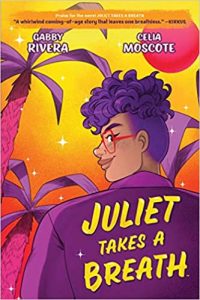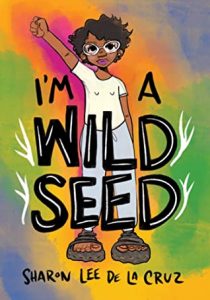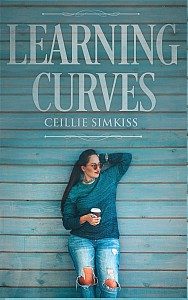Buy this from Bookshop.org to support local bookstores and the Lesbrary!
Back in 2016, when I first heard that there was a new young adult novel by a queer Puerto Rican woman from the Bronx who was also potentially my cousin (just kidding—all the Puerto Rican Riveras from the Bronx aren’t related, y’all), I remember feeling so excited. Juliet Takes a Breath by Gabby Rivera (she/her) is the story of Juliet Milagros Palante, a 19-year-old baby dyke from the Bronx navigating the coming out process, radical feminism, and what it means to be a queer person of color.
In December 2020, nearly five years after the novel’s debut, Rivera released the graphic novel adaptation of Juliet Takes a Breath with gorgeous illustrations by Celia Moscote. I read the novel the summer it came out and was blown away. I picked up the graphic novel seven years later and was just as impressed.
Juliet Takes a Breath is a coming of age story that opens on the eve of Juliet’s departure to Portland, Oregon for a summerlong internship with white feminist author Harlowe Brisbane. At family dinner, Juliet reveals that she is gay and has a girlfriend. Although Juliet’s brother, abuela, and titi are supportive, Juliet’s mother is rattled by her revelation and the two have little time to process their feelings before Juliet must leave. When Juliet arrives in Portland, she meets free-spirited Harlowe, who she clearly idolizes. However, as the summer progresses, Juliet develops her own queer identity, finds community amongst queer people of color, and comes to learn that Harlowe is not necessarily worthy of the pedestal upon which Juliet has put her.
Juliet Takes a Breath features a refreshingly diverse cast of characters, which includes individuals who are bisexual, trans, and biracial. Puerto Rican culture is also prominently featured in the graphic novel, infused into its language, history, and imagery. Juliet’s Puerto Rican-ness is the foundation of her identity. She is anchored by her close-knit family, which provides her unconditional love and support even amid conflict. Moscote perfectly captures the personalities and emotions of Juliet’s loved ones. Her renderings of Juliet, a beautiful, curvaceous young woman with caramel skin and dark curls, in various states of emotion—joy, anger, pleasure, and sadness—are stunning.
Seven years later, I still love this story. As a queer Puerto Rican woman with Bronx roots, it made me feel seen. Beyond that, I loved how Rivera educated her audience on the importance of intersectionality and community and boldly tackled complex and emotionally charged issues like the white savior complex in feminism. The graphic novel format made these topics even more accessible. I highly recommend checking it out!
Rivera is also the author of the original comic series b.b. Free, as well as Marvel Comics’ AMERICA series, which follows the adventures of America Chavez. If you’d like to learn more about Rivera, you can check out her Instagram, @quirkyrican, where she posts about her writing and the joys of being a “masc mom”.
Trigger warnings for sexual assault, racism, and white saviorism.
Raquel R. Rivera (she/her/ella) is a Latina lawyer and lady lover from New Jersey. She is in a lifelong love affair with books and earned countless free personal pan pizzas from the Pizza Hut BOOK IT! program as a kid to prove it.




